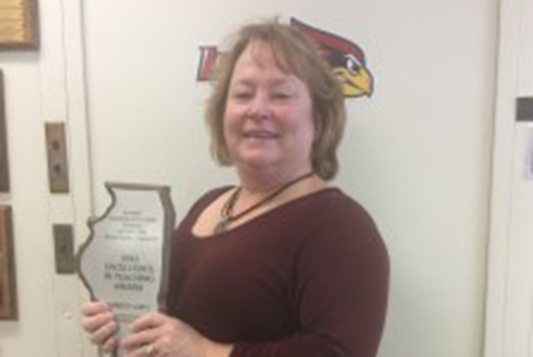Illinois State Special Education Professor Maribeth Lartz has received the Excellence in Teaching Award 2015 in the Illinois Teacher Education Division from the Council for Exceptional Children.
Lartz was surprised with the award at a department faculty meeting in September. She was flattered that her peers have recognized her efforts and nominated her for this award. This is an award that assesses how a teacher influences the field of special education and goes above and beyond in their work to help others in the field. “You don’t even realize it, but people are obviously watching you,” she said.
Lartz is in her 33rd year teaching at Illinois State University. “I love ISU and I love the Department of Special Education,” Lartz said. She said Illinois State is the best place to work. She gets to do what she loves to do. She plays a role in the lives of children that is incomparable and gets to see children learn things that are taken for granted by the majority of us, like talking and reading. “We get to see the change”, she said.
One exciting aspect of Lartz’s job is placing student-teachers with teachers who were her students 20 years ago. Last semester four of the seven cooperating teachers were Lartz’s previous students.
Lartz feels this was an award for the whole department because she is motivated by the motivated people around her. Those around her inspire her to do well. Lartz said the Special Education Department has high expectations of its students, with minimum requirements at a higher level than the state requirements. Lartz said Department of Special Education students have the right kind of drive, are the right kind of people, and are properly trained to be ready to teach when they graduate.
Lartz graduated from the University of Texas in Austin and then joined Illinois State’s Department of Special Education. Both of her maternal grandparents were deaf, so she grew up in a household that used sign language on an everyday basis.
Based upon her years of experience, Lartz thinks the biggest challenge for the deaf and hard of hearing children is that there are no longer large cooperative initiatives to help these children. A lot of children need more support than what the regular school or curriculum can offer. But, thankfully, those who are teaching the deaf and hard of hearing today have the benefit of having access to technology that helps with sound to provide opportunities to developing age-appropriate speech and language.
Many thanks to Lartz for her years of dedication to Illinois State University, the Department of Special Education, and the field of deaf and hard of hearing!


